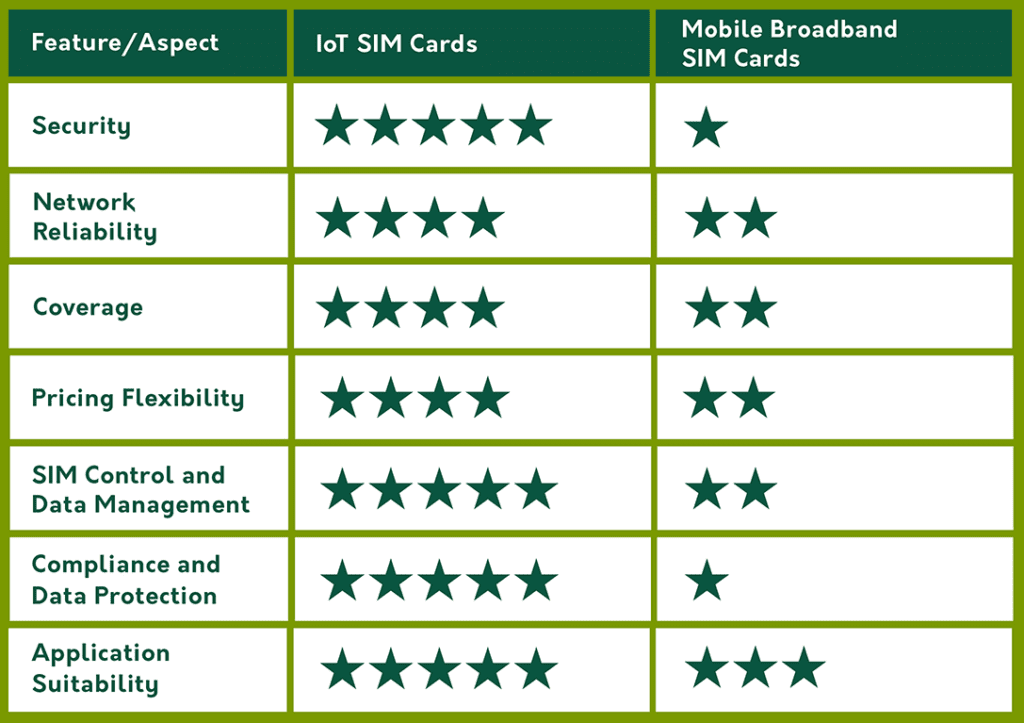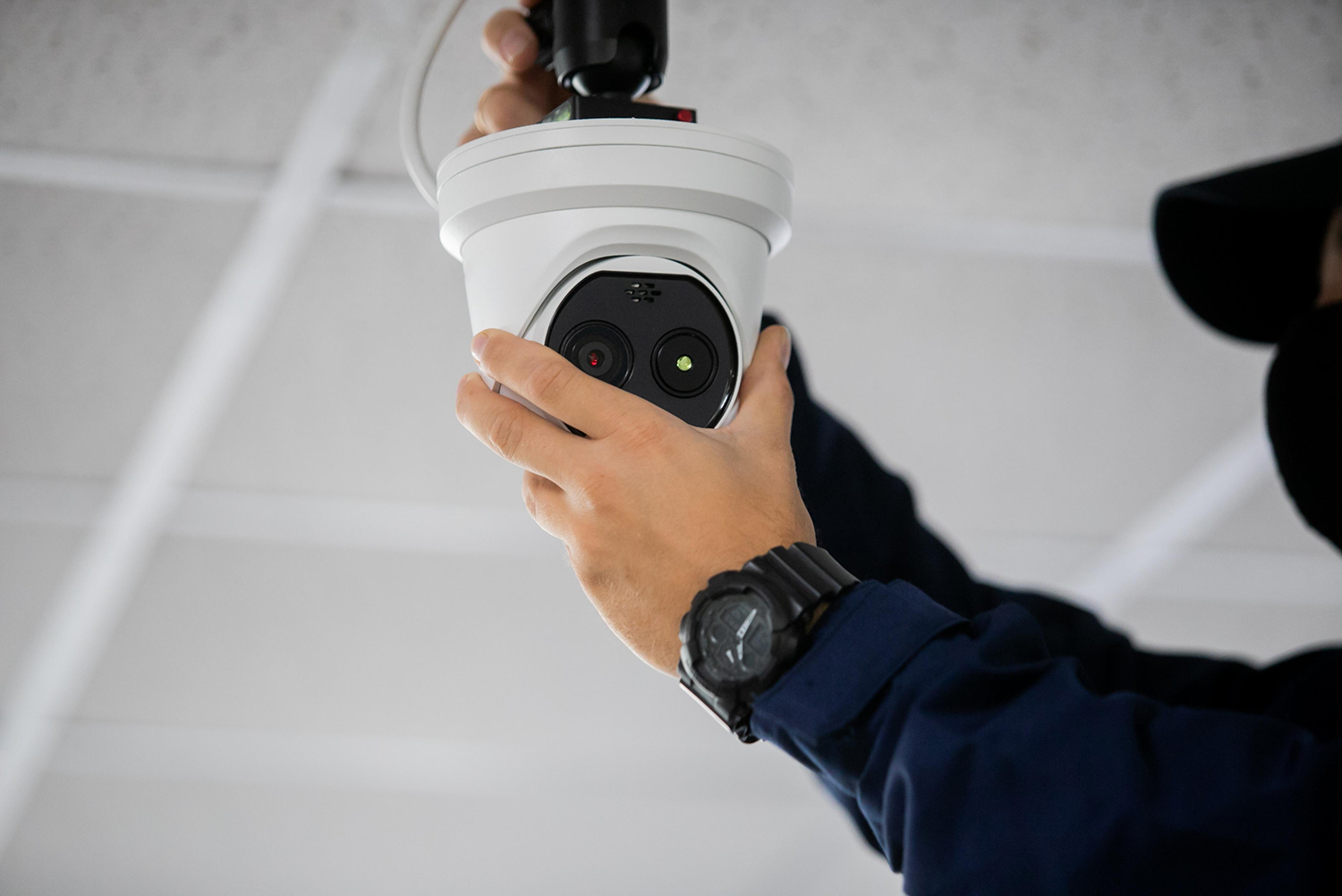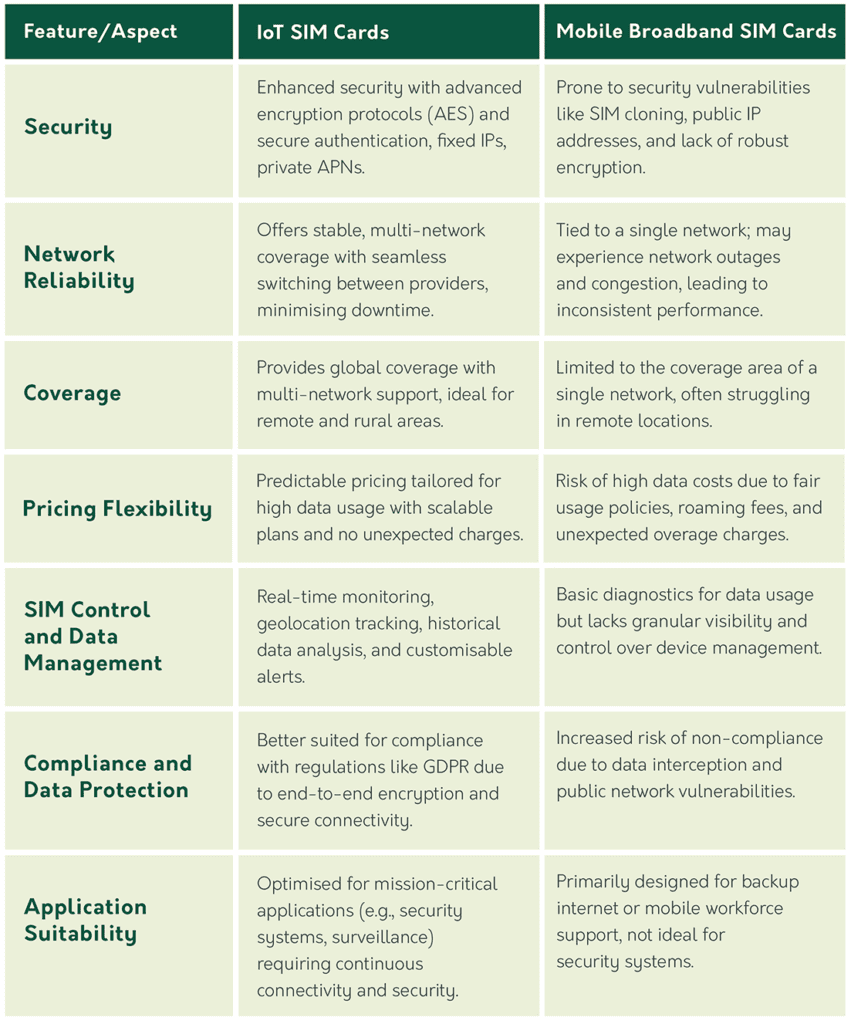
Are Mobile Broadband SIM Cards a Ticking Time Bomb for Security and Video Surveillance Devices?

Mobile-connected security devices are growing in popularity because of their affordability, mobility, and cost-effectiveness. Therefore, businesses are quickly becoming reliant on mobile SIMs to help power these security systems. However, these consumer-grade SIMs are a risky option for businesses due to their security flaws, network dependability problems, and pricing structure. This blog explores the risks of using mobile broadband SIMs in security/video systems and highlights why IoT SIMs are a superior alternative for modern security strategies.
IoT SIMs vs Mobile Broadband SIMs
The surge in mobile-connected security devices has been fuelled by their flexibility, mobility, and affordability. In 2022, the mobile video surveillance market was valued at £1.88 billion and is expected to grow by 8.5% annually through 2032. (Research, 2023). Rising crime rates, including fraud, theft, vandalism, and terrorism, drive the demand for adaptable surveillance solutions across various sectors, from consumer 4G home security systems to mobile CCTV towers. A key catalyst for growth in this sector is the decreasing cost of mobile data. In 2019, 1GB of data in the UK cost approximately £5.00 (Forbes, 2019), but by 2024, it had dropped to £0.50, a 90% decrease (Cabel, 2024). With the average IP cloud camera consuming 1-2 Mbps (assuming 1080p using H.264 codec at 6-10fps) (Verkada, n.d.), a camera can consume 16 GB per day, costing over £243 per week*. To manage these costs, businesses often use consumer-grade mobile broadband SIM cards instead of IoT SIMs, inadvertently creating significant security risks. Consumer SIMs pose security vulnerabilities such as data interception, SIM cloning, risk of disconnections and insufficient encryption. They also suffer from network reliability issues like congestion, signal interference, and bandwidth limitations, affecting the security system’s performance.
The high data consumption of these systems leads to prohibitive out-of-bundle fees and roaming charges. Mobile network operators have at times disconnected consumer SIMs when they judge the usage is breaching the terms and conditions or the SIMs are breaching the regulation (e.g. a roaming SIM used permanently in a neighbouring country). In contrast, IoT SIMs offer enhanced security features, including end-to-end encryption and secure authentication, ensuring data integrity and permanent roaming. They provide optimised network reliability with dedicated connectivity, high uptime, and adaptive coverage. IoT SIMs are also cost-effective, offering predictable pricing, global coverage, and scalable plans.

Mobile Broadband SIMs – A Wolf in Sheep’s Clothing?
For many businesses, mobile broadband SIM cards appear to be the perfect solution for remote and wireless security needs. The convenience of deploying security devices, such as video-relaying CCTV systems, without the need for wired connections is undeniably attractive. Additionally, with the advent of unlimited data options at highly competitive rates, mobile broadband seems to offer a cost-effective way to enhance video security while maintaining or even increasing profit margins. However, these mobile broadband SIM cards can be a wolf in sheep’s clothing, bringing with them a host of risks that must be carefully considered.
> Security Vulnerabilities
Mobile broadband SIM cards are typically used for specific purposes such as providing backup internet or supporting a mobile workforce. However, using these SIM cards in security/video devices can pose risks for the user, primarily due to the lack of fixed IP addresses and private APNs (Access Point Names).
The absence of a fixed IP address can create challenges for security devices as they rely on stable connections for remote access and consistent communication. Without a fixed IP address, accessing and managing security devices such as CCTV cameras remotely becomes difficult, as dynamic public IPs assigned by mobile networks change frequently, disrupting continuous monitoring and access, and also producing an opening for hackers.
Additionally, the lack of a private APN and the use of public IP addresses means that data transmitted by security devices over mobile broadband is vulnerable to potential interception and unauthorised access, as it travels over shared network infrastructure. There are today 3.5 million connected cameras with a public IP address, open to potential cyber risks (source: shodan.ai). Private APNs provide a more secure and isolated connection, enhancing security and reducing the risk of cyber-attacks.
The absence of these features can compromise the security and reliability of mobile broadband-based security systems, making devices more vulnerable to hacking, unauthorised access, and data breaches. Consequently, while mobile broadband SIM cards offer flexibility and convenience, they also bring substantial security challenges that need to be carefully managed, especially in the context of using them for security devices.
> Latency and Bandwidth Issues
Latency is a significant issue with mobile broadband. Unlike wired connections that offer relatively low latency, mobile networks can experience delays due to the nature of wireless communication. This increased latency can hinder the performance of security devices, particularly those that rely on real-time data, such as CCTV cameras. Delays in the video feed can affect the ability to monitor events, potentially leading to slower response times in critical situations.
Bandwidth limitations pose another major challenge. Security devices, especially those that transmit high-definition video, require substantial bandwidth to function effectively. Mobile broadband often cannot provide the necessary bandwidth permanently to support multiple high-resolution video streams simultaneously. This can result in lower video quality, interrupted feeds, and dropped frames, impacting the ability to maintain effective surveillance.
Network congestion further exacerbates these bandwidth issues. Mobile broadband is a shared resource with other consumers, meaning that network performance can degrade significantly during peak usage times when many users are accessing the network simultaneously. This congestion can lead to inconsistent connectivity and variable video quality, making it difficult to ensure reliable security monitoring.
Even with unlimited data plans, the actual throughput can be affected by fair usage policies and network management practices, which can throttle speeds during heavy usage periods. This means that the promised “unlimited” data may not always translate into consistent high-speed access, particularly when it’s most needed.
> Coverage and Reliability
Unlike IoT SIM cards that can offer multiple networks, Mobile broadband SIM cards are typically tied to a single mobile network, which can work well in built-up areas where coverage is strong. However, in rural and remote locations, coverage from a single network can be unreliable due to fewer masts and less network infrastructure, leading to weaker signals and more frequent connectivity issues. This variability can significantly affect the performance of security devices.
Network outages are another significant risk. Relying on a single network provider means that any issues or outages with that network will disrupt all connected security devices simultaneously. This can leave security/video systems non-functional during critical moments, posing a significant risk for businesses that depend on continuous monitoring and rapid response.
Therefore, while mobile broadband SIM cards offer flexibility, their reliance on a single network introduces a level of risk in terms of coverage and reliability. For security devices that require maximum uptime, businesses need to carefully question whether mobile broadband SIM cards can provide the necessary coverage and reliability needed for effective and dependable security monitoring. Pairing this with the inferiority of consumer mobile broadband SIMs compared to IoT SIMs which have fewer read/write cycles and limited lifespan, businesses may find that consumer-grade SIMs are not robust enough for mission-critical applications.

The Data Protection Risks of Mobile Broadband SIMs
Mobile broadband SIMs used for device data transmission face security risks like SIM cloning, which can enable unauthorised access to sensitive video data and violate data protection regulations.
Across the world, data protection laws are in place to safeguard the public’s personal information. These laws impose strict requirements to ensure the integrity, confidentiality, and security of data, especially when it comes to security devices like CCTV cameras.
However, using mobile broadband SIMs to transmit data from these devices introduces specific risks that can jeopardise compliance with these regulations.
One such risk is SIM card cloning, where malicious actors replicate the SIM to intercept or redirect data traffic. This can lead to unauthorised access to sensitive video footage, resulting in data breaches and non-compliance with data protection regulations.
Let’s look at one law in particular, the General Data Protection Regulation (GDPR) in the UK:
The GDPR emphasises the importance of maintaining the confidentiality and integrity of processing systems and services.
To meet confidentiality requirements, personal data should only be accessible to authorised individuals but mobile broadband networks can be more susceptible to unauthorised access due to their reliance on shared public infrastructure.
To meet integrity requirements, the data needs to remain accurate and unaltered, however, due to the susceptibility to hacking of mobile broadband SIM cards, there is a higher likelihood of data tampering or corruption during transmission.

Quantifying the Risk of Devices with a Public IP Address
With the rapid advancement of AI technologies, quantifying the risks faced by the security and CCTV industry is more accessible and precise than ever before.
Tools like Shodan.io have made it possible to identify and quantify the number of security devices that are exposed and accessible to the internet. According to Shodan.io, there are over 3.4 million CCTV cameras and other security devices worldwide that are actively vulnerable, inclding 137,071 in the UK. (Shodan, 2024).
For security devices that do not use encrypted secure connectivity, such as those relying on mobile broadband, Shodan.io can identify critical information such as open ports. These open ports can be probed for vulnerabilities in web server software, including outdated versions of popular servers like Apache or Nginx. Identifying these vulnerabilities provides hackers with opportunities to exploit weaknesses in the system.
Additionally, Shodan.io reveals information about the technology stack used by these security devices, allowing hackers to pinpoint and exploit vulnerabilities in insecure plugins or add-ons. This information can be used to launch targeted attacks, leveraging known issues within specific software components. SSL certificate information is also accessible through Shodan.io, enabling hackers to detect potential misconfigurations or weaknesses in the SSL implementation. Misconfigured SSL certificates can leave security devices susceptible to man-in-the-middle attacks, where intercepted data can be manipulated or stolen.
The data provided by Shodan.io underscores the importance of using secure, encrypted connections and keeping software up to date. For businesses relying on mobile broadband for their security systems, it is essential to regularly assess and address these risks. Employing advanced security measures, such as end-to-end encryption, regular software updates, and robust network configurations, can significantly mitigate these vulnerabilities and enhance the overall security posture.

What’s the Answer?
With clear risks associated with using mobile broadband SIM cards for security devices, owners of these devices must take action to mitigate these vulnerabilities. But how? The answer lies in using IoT SIM cards specifically designed to enhance security, reliability coverage, and compliance.
IoT SIM cards are specialised SIM cards designed to meet the specific needs of IoT and M2M devices, such as security cameras and other monitoring systems. They offer several key advantages that address the risks associated with using traditional mobile broadband SIM.
> Enhanced Security
IoT SIM cards utilise advanced encryption protocols, such as AES (Advanced Encryption Standard), which are more robust compared to the encryption used in traditional consumer mobile broadband SIM cards. This heightened level of encryption provides an additional layer of security, significantly reducing the vulnerability to hacking and unauthorised access by external attackers.
Furthermore, IoT SIM cards are designed to be assigned fixed IP addresses. This feature not only enhances network management but also ensures secure and consistent access to the connected devices. In practical terms, these SIM cards provide a stable and reliable connection, which is especially advantageous for remote monitoring and control applications. The reliability of the connection facilitates easier and more secure data transmission, crucial for ensuring the seamless function and security of IoT devices.
This ensures continuous connectivity and minimises downtime, which is crucial for maintaining the functionality of security devices. By leveraging multiple network providers, IoT SIM cards can provide more reliable coverage, especially in remote or rural areas where single network coverage might be weak or inconsistent. This capability not only enhances the operational reliability of security systems but also ensures that data transmission remains uninterrupted, thereby maintaining compliance with data protection regulations and ensuring that critical security monitoring is not compromised.
> Predictable Pricing
While mobile broadband SIMs may offer unlimited tariffs, they often come with fair usage policies that can limit their practicality for extensive data usage. In contrast, IoT SIM cards are specifically designed for higher data consumption, providing a more predictable cost structure that eliminates the risk of unexpected overage charges. This makes them an ideal choice for businesses needing reliable and scalable connectivity solutions.
Partnering with a global IoT connectivity provider further mitigates risks associated with excessive roaming charges, especially for devices that frequently move across borders. Companies like Croft, for example, offer IoT roaming services in 191 countries, ensuring seamless and cost-effective connectivity worldwide. By leveraging such partnerships, businesses can achieve better operational efficiency and cost management, making IoT SIM cards a superior choice for large-scale deployments and international security operations.
Furthermore, IoT SIM cards are designed to be assigned fixed IP addresses. This feature not only enhances network management but also ensures secure and consistent access to the connected devices. In practical terms, these SIM cards provide a stable and reliable connection, which is especially advantageous for remote monitoring and control applications.
The reliability of the connection facilitates easier and more secure data transmission, crucial for ensuring the seamless function and security of IoT devices.

> Complete Visibility and Control with IoT SIMs
Some mobile broadband SIM cards offer basic diagnostics for data usage and bundle monitoring. However, IoT SIM cards provide more granular information, which is particularly vital for security and CCTV applications. Here are several reasons why IoT SIM cards are superior to mobile broadband SIMs in these contexts:
Real-time Monitoring
IoT SIM cards provide real-time data usage metrics and signal strength monitoring, essential for the continuous surveillance needs of security and CCTV systems.
Geolocation Tracking
Tracking the location of mobile surveillance units helps optimise resource deployment, enhancing operational efficiency.
Historical Data Analysis
Analysing historical data assists in forecasting and optimising data plans, ensuring uninterrupted service.
Connectivity Status Alerts
Real-time alerts on connectivity status and device uptime enable rapid troubleshooting, minimising downtime and maintaining continuous surveillance.
Battery Level Monitoring
Monitoring the battery levels of battery-operated devices ensures they remain functional, especially in critical areas.
Enhanced Security Features
Detailed access logs, error reporting, and data encryption protect sensitive information from unauthorised access and interception.
IoT SIMs Versus Consumer Mobile Broadband SIMs
The surge in mobile-connected security devices has been fuelled by their flexibility, mobility, and affordability. Rising crime rates, including fraud, theft, vandalism, and terrorism, drive the demand for adaptable surveillance solutions across various sectors.
IoT SIM cards are specifically designed to enhance security, reliability coverage, and compliance. They are specialised SIM cards designed to meet the specific needs of connected devices. They offer several key advantages that address the risks associated with using traditional mobile broadband SIMs. Our IoT SIMs Versus Mobile SIMs data sheet offers a clear comparison of the benefits of using IoT SIM cards over Mobile Broadband SIMs.

Looking for Secure Connectivity for Your Security Devices?
Croft have extensive experience in supporting businesses in deploying connectivity for CCTV, access control and intrusion detection systems. From taking the time to understand your requirements to delivering the best solution to ensure your devices remain connected.
- Unbeatable prices on IoT data in UK and Europe
- Security with static IP, SSL VPN and IPSEC options
- Unsteered solutions to connect to the strongest network
- Access all 4 UK networks on 1 SIM card
For IoT SIMs connectivity solutions that you can rely on contact one of our Croft experts!
